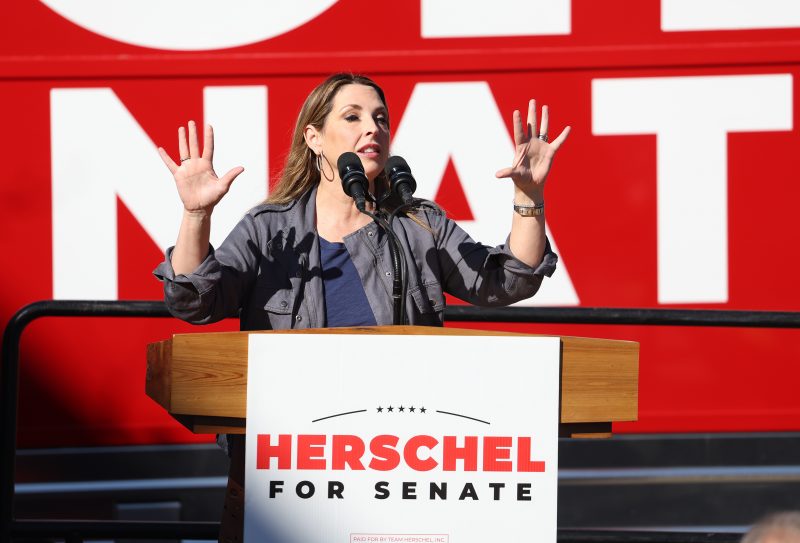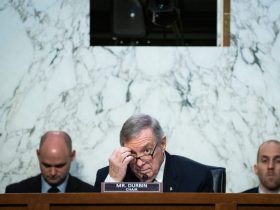There is basically no doubt that Donald Trump cost the GOP key races, and possibly control of the Senate, in the 2022 election. The data is unmistakable when it comes to how his endorsed candidates performed compared to other Republicans. And because Trump was eager to exert his influence in swing states and in big races, that influence was particularly costly for the GOP where it mattered most.
Not many Republicans are willing to say that out loud, of course. But in an interview Monday on Fox Business Network, Republican National Committee Chair Ronna McDaniel essentially made that point — while trying to avoid packaging it as such.
Host Stuart Varney was keen on getting McDaniel to weigh in on her party’s 2022 Trump problem. She — understandably, given her desire to continue leading the RNC — was not terribly keen on being so direct.
“Would you say publicly that Donald Trump bears any responsibility for some of the losses in the midterm elections?” Varney asked.
McDaniel responded: “You know, I don’t like this. I don’t like these parceling out [of responsibility], because he supported [North Carolina Senate candidate] Ted Budd, who won, and he supported [Ohio Senate candidate] J.D. Vance, who won.”
Fox Business’ Stuart Varney: “Would you publicly say that Donald Trump bears any responsibility for some of the losses in the midterm elections?”
RNC Chairwoman Ronna McDaniel: “I don’t like this.” pic.twitter.com/D99SxcYGeY
— The Recount (@therecount) December 12, 2022
It’s true that some Trump-backed candidates won, especially in states like North Carolina and Ohio (which Trump also won twice).
The picture elsewhere was decidedly less friendly for Trump’s endorsements, though. And you only need to look at the next two states that McDaniel herself brought up while trying to talk around the question.
“But here’s the one thing that I think people should be talking about: the amount of ticket-splitting — the amount of Republicans that went out and voted for a Republican at the top of the ticket,” McDaniel said.
“Look at Arizona; the top vote-getter is a Republican,” she added. “Look at Georgia. We had eight of nine statewide races won by Republicans.”
As it happens, these might be the two states in which the Trump effect was the most pronounced, because of the contrasts they provide.
That Republican who won more votes than anybody in Arizona? It was state Treasurer Kimberly Yee, who dropped out of the gubernatorial race after Trump endorsed Kari Lake. Yee won reelection by double digits. The GOP’s candidate for state schools superintendent also won narrowly.
Neither was backed by Trump, but the other four statewide GOP candidates were. And it looks like all four of them, including Lake, have lost. (There is a recount in the state attorney general’s race, where the Trump-backed candidate trails narrowly.)
Georgia was perhaps an even more telling case. As McDaniel alluded to, Herschel Walker’s loss in the Senate race came as the eight other statewide GOP candidates all won by at least five percentage points, and by an average of more than seven points. Half of them did so after handily defeating Trump-backed primary challengers. Only one Trump-backed candidate won the primary and the general election: his pick for lieutenant governor. Georgia provided the biggest rebuke of Trump during the primary season, and it turned out to be a very good thing for the party in the general election.
So all told, across these two states, there were 15 statewide races. Five of the six Trump-backed candidates lost; all nine of the candidates Trump hadn’t endorsed won.
Heck, even in one of the supposed Trump success stories McDaniel cited, Ohio, the picture was pretty similar. Vance won by just six points even as the other statewide executive-office GOP candidates won by an average of more than 20 points. The biggest winner? Gov. Mike DeWine (R), whom Trump declined to back in a contested primary (but later backed in the general election, where DeWine was a huge favorite).
So, yes, in a sense 2022 was about ticket-splitting. It’s just that almost all of the most pronounced cases of ticket-splitting involved Trump candidates badly underperforming — not just in Arizona, Georgia and Ohio, but also in New Hampshire, Michigan and in a series of House races.
It might not be that voters looked at the Trump-backed candidates and thought, “I don’t like Trump-backed candidates.” But at the very least, Trump’s endorsements saddled the GOP with flawed candidates. In Georgia, GOP voters mostly dispatched those candidates in the primary (with the notable exception of the state’s Senate race); in Arizona, though, the person who wound up being the party’s most successful candidate — by far — was effectively pushed aside.
“But why are Republicans going and voting for one Republican and not another?” McDaniel asked.
The question was rhetorical, but Varney immediately volunteered an answer: “Trump. You posed the question. The answer is Trump. Isn’t it?”
McDaniel again demurred, responding that the GOP needed time to do an “analysis” to figure it out. But judging by the states she highlighted, it probably shouldn’t take long.






